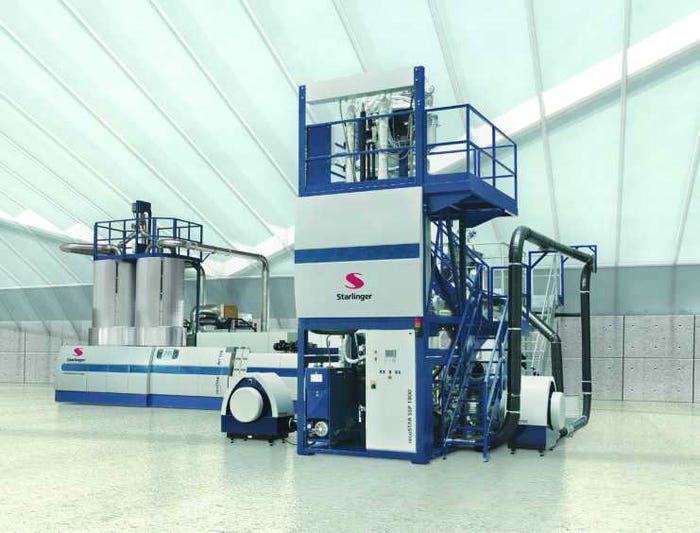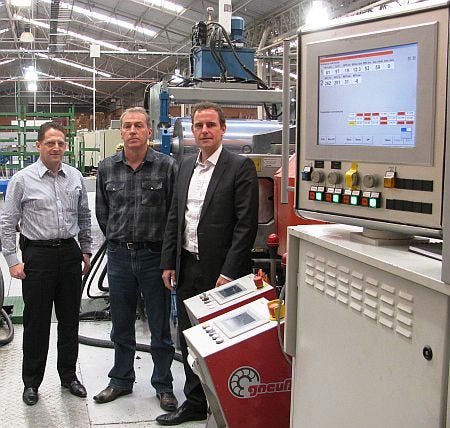Emerging markets look to recycle PET locally
Austrian recycling machinery producer Starlinger recently supplied equipment for a pioneer PET recycling project in Uzbekistan, installed by Geleon Link. The Tashkent-Uzbekistan based company purchased a Starlinger recoSTAR PET 125 HC iV+ recycling line for processing post-consumer washed and dried PET bottle flakes. The line has an output capacity of around 8000 tons/yr with the recycled food-grade PET material produced to primarily be used for the domestic market.
January 9, 2013
Austrian recycling machinery producer Starlinger recently supplied equipment for a pioneer PET recycling project in Uzbekistan, installed by Geleon Link. The Tashkent-Uzbekistan based company purchased a Starlinger recoSTAR PET 125 HC iV+ recycling line for processing post-consumer washed and dried PET bottle flakes. The line has an output capacity of around 8000 tons/yr with the recycled food-grade PET material produced to primarily be used for the domestic market.
Yuldosh Kazakov, Starlinger sales representative in Uzbekistan, told PlasticsToday that Geleon Link partnered with Starlinger due to the company's process, which allows the recycler to treat the recycled pellets in the SSP reactor at the end of the production process and increase their intrinsic viscosity (IV) according to the specifications needed for the target application.
 In addition, Starlinger has a representative office in Uzbekistan, which ensures that the customers get quick sales and service support.
In addition, Starlinger has a representative office in Uzbekistan, which ensures that the customers get quick sales and service support.
In Western Europe, rPET production capacity continues to exceed market value, but in many Eastern European countries plastic recycling projects are just now getting underway. Starlinger states that these countries are now beginning to recognize the potential that lies in using secondary materials, or waste products, to replace primary materials.
"Uzbekistan is fostering local production in order to maintain and increase the growth of the national economy," Kazakov said. "Employment policies and unemployment reduction play a role, as does industrial development and better use of the country's resources. Uzbekistan has followed this policy since its independence in the 1990s. The government support is reflected in tax reliefs for machinery imports for the businesses."
The Geleon Link project also fits into the framework of the localization policy Uzbekistan is currently pursuing to reduce imports and support businesses that manufacture goods locally. In the case of PET granulate, Uzbekistan is importing around 70,000 tons/year at an average price of US $2000/ton. To produce even just a portion of this quantity within the country could create a huge savings potential, Starlinger stated.
Elfriede Hell, general manager of the business unit for Starlinger recycling technology, said that Eastern Europe and Central Asian countries have, unlike Western Europe, the possibility to develop new guidelines for regulating and promoting local production. Such regulations not only benefit the economy of the country, but also companies like Starlinger as the companies in those countries need the technology and equipment to establish a local production facility, which creates market opportunities for technology suppliers.
Hell said geographically that Central and North America remain very strong markets for Starlinger. In addition, there are several new initiatives in Arab countries, and the company also aims to approach high-end recycling in East Asia.
Starlinger works to increase business worldwide by undertaking active business development activities and research in the different markets along with constant participation in events such as conferences and fairs where the major players of the industry can get to know the company and its offerings.
"Furthermore, Starlinger goes local, such as strengthening the staff in our Uzbekistan office, which allows us to address a wider market," Hell said. "Flexibility and modularity of the equipment is important to the different requirements of the markets."
Brazil increasing local production
One emerging market that looks to produce locally is Brazil. In March 2012, Monika Gneuss, VP of sales and marketing at Gneuss, told PlasticsToday that the company recently sold four PET recycling lines in Brazil.
"We have sold lines in Europe, North and South America, but with these four lines that we sold in Brazil recently, we have certainly seen a surge in South America," she said. "We have always been very successful in South America with our filtration systems. But of course, in the end, decisions are being made based on return-on-investment calculations."
have certainly seen a surge in South America," she said. "We have always been very successful in South America with our filtration systems. But of course, in the end, decisions are being made based on return-on-investment calculations."
Brazilian company Unnafibras ordered three recycling lines from Gneuss.
Two lines were purchased for the production of textile fibers; one was laid out for bottle-to-bottle recycling.
At Unnafibras' headquarters in Santo André, the first two lines produce co-extruded polyester fibers from recycled material, with a total capacity of 1500 kg/hr. The third line, which reaches a capacity of 2000 kg/hr, is operated in Paraiba. Pellets are produced from PET bottle flakes, and are used by local injection molding companies for the production of bottle preforms.
Nova Pack, another Brazilian company, specializes in the production of thermoforming sheets made of PET, PP, and PS. For PET sheet production, the company had used in-house or purchased recycled material for several years. Nova Pack recently made a switch and invested in the extrusion line with the MRS Extruder to produce packaging made from 100% recycled material.
PET recycling in Europe
There are roughly five million tons of PET flakes available for recycling around the world, according to plastics recycling machinery manufacturer Erema. Around one million tons of PET flakes are recycled in Europe every year.
Plastic is increasing as a valuable secondary raw material, an Erema spokesperson told PlasticsToday. Whereas plastic waste has increased by 8% per year over the last decade, the decline of primary raw material resources is increasing on a drastic scale, the spokesperson said.
In addition, the Erema spokesperson projects that landfill bans for plastics, which are in place for seven countries, may be extended throughout Europe.
"Some 10 million tons of plastic are put into landfill every year. Should this come to an end, there will be even larger amounts of valuable secondary raw materials available for worthwhile processing," the spokesperson said said. "This means that more and more importance is being attached to high-quality secondary raw materials."
About the Author(s)
You May Also Like


